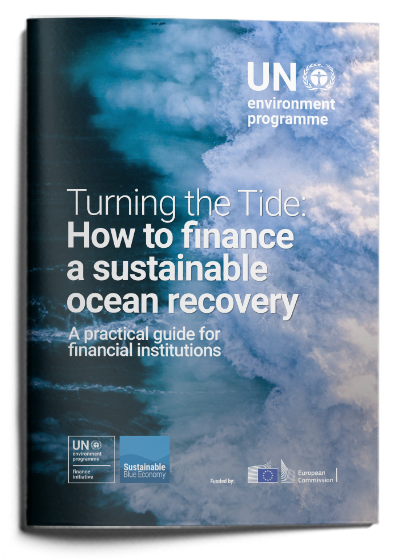The ocean covers 70% of the earth’s surface, holding 97% of all water and 80% of all life forms. Major ocean sectors such as tourism, shipping, fishing, aquaculture and marine renewable energy collectively contribute to a ‘blue’ economy, estimated at a global gross value added of USD 1.5trn in 2010. This is projected to double in size to USD 3trn by 2030, with some ocean industries set to grow faster than the global economy (OECD, 2016).
However, ocean health is under existential threat. Faced with the triple crises of pollution, nature loss and climate change, two-thirds of our oceans have been negatively altered by human activity; leaving industries, businesses and livelihoods exposed. With existing financing still largely directed towards unsustainable sectors and activities, it is critical that all sectors of the blue economy are rapidly transitioned towards sustainable pathways.
Banks, insurers and investors have a major role to play in financing this transition to a sustainable blue economy, helping to rebuild ocean prosperity and restore biodiversity to the ocean. Through their activities, and client relationships, financial institutions have a major impact on ocean health and hold the power to accelerate and mainstream the sustainable transformation of ocean-linked industries. They thereby play essential roles in wider ocean governance, engaging in public-private partnerships, and propelling local-to-global actions for sustainability.
“Momentum is building as more banks, insurers and investors wake up to the realisation that their financial activities can have a sizeable impact on ocean health, creating a negative feedback loop for key ocean industries such as shipping, fishing, tourism and marine renewables. A new sustainable pathway for the blue economy is thus both an environmental and economic necessity. This critical new guidance provides a practical toolkit for financial institutions to understand their impact and discover how a new sustainable finance approach can help them identify key risks and opportunities in ocean-linked sectors.” – Eric Usher, Head of UNEP FI
Leveraging best practice based on input from more than 50 pioneering institutions and experts, this guidance sets out pathways to sustainable growth across five key ocean sectors, chosen for their established connection to private finance. It includes recommendations with a detailed breakdown of which activities to seek out as best practice, which activities to challenge, and which activities to avoid financing completely due to their damaging nature.
This guidance provides decision-makers across banking, insurance and investment with a science-based and actionable toolkit, giving easy-to-follow recommendations on how to approach financial activity related to:
- Seafood, including both fisheries and aquaculture as well as their supply chains;
- Ports;
- Maritime transportation;
- Marine renewable energy, notably offshore wind; and
- Coastal and marine tourism, including cruising.
It supports the implementation of the Sustainable Blue Economy Finance Principles – a keystone for financing activities in the blue economy, supported by a community of over 50 institutions worldwide with a collective total asset size of over USD 6trn.
Download the guide and recommendations
“Decades of unsustainable consumption and production is leading to environmental risks and losses in natural capital, eroding the ocean’s resource base. Without engagement by financial institutions, we will not be able to change the course to sustain a healthy ocean and unlock its enormous potential. 1$ of sustainable ocean investments can yield 5x higher global benefits. This new guidance can help financial institutions invest in good ocean governance at local, regional and global levels. In a nutshell, making sustainable blue economy opportunities too hard to resist”. – Leticia Carvalho, Head of the Marine and Freshwater Branch, UNEP
About the Sustainable Blue Economy Finance Initiative:
UNEP FI convenes a global financial community on Sustainable Blue Finance, focused on the ocean and sustainable use of marine resources which supports the implementation of the Sustainable Blue Economy Finance Principles. The initiative works across the financial community to provide guidance and frameworks to ensure investment, underwriting and lending activities are aligned to the UN Sustainable Development Goal 14, ‘life below water’ enabling financial institutions to rebuild ocean prosperity, restore biodiversity and regenerate ocean health.



